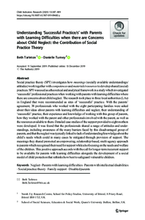Displaying 491 - 500 of 1171
CELCIS has gathered together important guidance, information and resources to help children and families in Scotland and the UK during the COVID-19 crisis.
This paper reports findings from an innovative arts-based intervention with Looked After Children and Young People and concludes that holding these competing value sets in creative tension is central to the success of the programme in helping young people to cope with and contest social harm.
This book brings together knowledge of how modern countries in Europe and the United States deal with the issue of errors and mistakes in child protection in a cross-national perspective.
The following evaluation looks at a dialectical behavioural therapy (DBT) skills group implemented with young females in a Scottish residential service.
This guidance provides local authorities and health boards, working in partnership with other public bodies and organisations, with information and advice about how they should exercise the functions conferred by Part 3 (Children’s Services Planning) of the Act.
In this article the authors look for a suitable method which takes account of power relations while investigating young people's perspectives on their everyday lives.
In this video clip, poet Lemn Sissay discusses his experiences in care and his battle to get hold of his care files, among other topics.
This paper reports a small qualitative research study where 10 sets of grandparents were interviewed to explore their journey to becoming GSGs and to theorize their subsequent experiences.
Social practice theory (SPT) was used as a theoretical and analytical framework in a study which investigated ‘successful’ professional practices when working with parents with learning difficulties where there are concerns about child neglect.
The aim of the present study was to provide an exploratory account of foster carers’ lived experience of ending adolescent foster placements.



